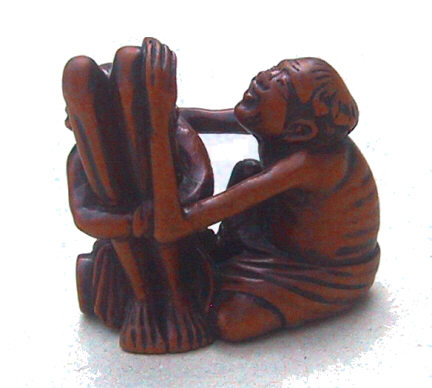The people walked many days and nights. (Some count this time in months, others in years.) They crossed a sea and a desert, they were exhausted and disappointed. To strengthen discipline the couple introduced certain laws. They maimed the hand which spilled water on the fire and cut out the tongue which spit curses. They forbade people from gazing at the clouds and ordered them to break necks of the first-born donkeys fallen out of their mother's wombs with their heads down.
The strongest ones rebelled and tried to turn back but the will of the couple was stronger than these occasional rebels. And the people went further and further. Many perished and died and children took the place of their parents, but the couple still led them onwards. Once more they crossed a desert and once more crossed a sea. And the time came when the people did not want to go further. They saw a fertile valley and a river and grassy meadows for their cattle. There they stopped because the river meant life and because they were tired. They built their houses and fortified their village with a thick stone wall and started to plow their fields and bury their dead. They did not need the couple anymore. And the couple disappeared…
I turned my face to the right. A museum curator, a tall woman with spectacles - it seemed she had been watching me for some time. I politely nodded.
"Where are you from?" she asked.
"Israel." I answered.
"Oh! There is a legend that the Japanese are one of the ten lost tribes."
I shrugged.
"Would you join me for lunch? There is a small Japanese restaurant nearby."
"No, I have other plans. Besides, I do not like seafood. Let me take a rain check." A shadow of a smile passed over her face and disappeared. To cover an awkward pause I asked: "What happened with the couple?" Her eyes sparkled.
Legend says, she told me, that the couple went up to the top of the mountain and there, in a small cave, the tall carrier carefully put his burden on the ground. The short-legged one asked him to arrange a small fire and give him a piece of scroll; it was done. A confused arc of the story suggests that upon leaving the cave, the tall carrier did something unusual - some versions tell that he said a few encouraging words, others that he lifted his hood for a second. The short-legged one laughed, pressing the scroll to his chest. Then he wrapped himself in a short coat and, looking at the fire which would soon die because the wood was damp, began to sing a song.
A passing caravan caught a refrain of the song and sang it down in the village. Recognizing the song, a group of people arose and went to the top of the mountain to find the short-legged one to give him a proper burial, but found only a pile of ashes encircled and guarded by a snake.
The legend continues that for some inscrutable reason the men from the village still continue their search, though none knows exactly what he is looking for. Long ago they were dispersed across the world, but their descendants still easily recognize one another. The legend also says that the village they left was doomed to destruction and that its revival depends solely upon completing this search. The end of the story is sunk in obscure arithmetical computations on when this might happen, and a crucial role is attached to the length of the stone wall around the village.

A year later, while cleaning my desk, I ran across an entrance ticket with the museum's name on it and immediately recalled that ivory statuette: grinning Tenaga and gloomy Ashinaga. I reached for the telephone and asked for any nearby Japanese restaurant, then made another call and ordered a table for two. I picked up my pen.

May, 2004
May, 2004
February, 2004
December, 2003
December, 2003
Changes of season and changes of heart
June, 2003
December, 2002
October, 2003
September, 2003
August, 2003



Jews, Goddesses
and the Zohar
Jill Hammer
Hasidism and Homoeroticism
Jay Michaelson
Lag B'Omer:
Sound & Image
Andy Alpern and
Shir Yaakov Feinstein-Feit
Couple
Ari Belenkiy
One Ring Zero
Paul Fischer
Josh's Jury Duty
Josh Ring
Archive
Our 480 Back Pages
Saddies
David Stromberg
Zeek in Print
Spring/Summer 2004 issue now on sale!
About Zeek
Mailing List
Contact Us
Subscribe
Tech Support
Links
From previous issues:
Strasbourg Cathedral
Michael Shurkin
Wagner in Israel
Margaret Strother Shalev
The Truth about the Rosenbergs
Joel Stanley
No Pulp
Dan Friedman
 Email us your comments
Email us your comments